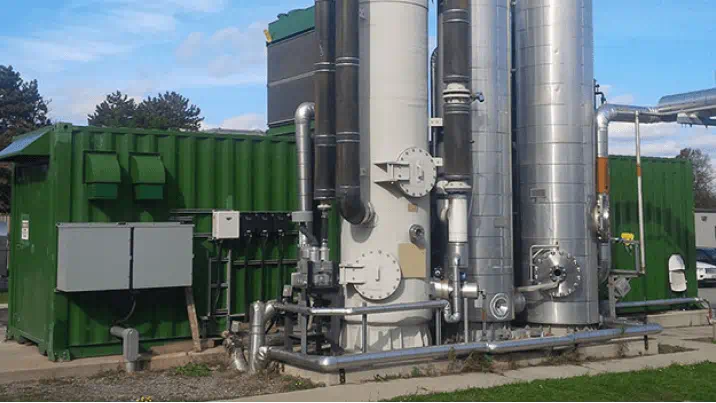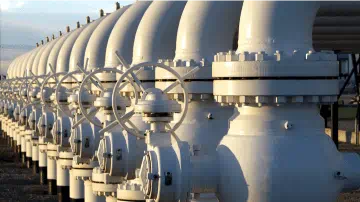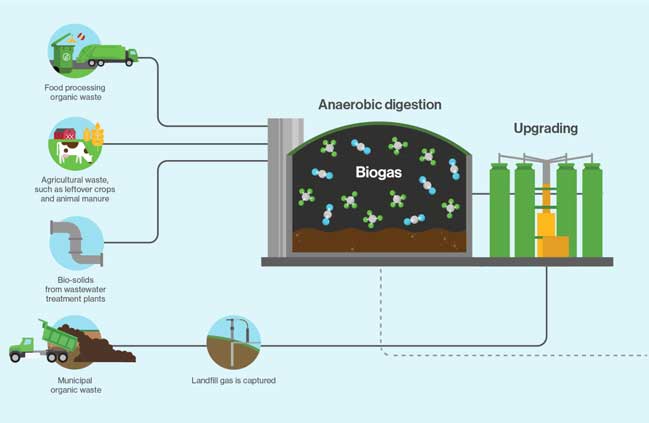Turn your waste into revenue
Turning organic waste into RNG is a win-win opportunity. You’ll generate a new revenue stream while diverting methane emissions from the atmosphere. We’re here to guide you through the process, with financial and technical support.
Who can produce RNG?

Farms and agribusinesses
Turn agricultural waste into RNG to reduce the burden of managing waste and create a new source of income.

Food and beverage processors
An effective waste reduction strategy that reduces emissions and can fuel processes more sustainably.

Landfill and wastewater management
Close the loop on organic waste by turning it into RNG. Create a new revenue stream and fuel fleets.

Municipalities
Adopt a circular economy approach—free up landfill space, meet climate targets and fuel fleets for less.
From feasibility to financing, we’re here to help
Whether you’re planning to produce RNG or ready to start selling supply, we’ll guide you through the process, with technical expertise and financial support.
1. Assess your facility
First, we’ll help determine whether your facility is suited to and has the capacity to produce RNG.
2. Produce your RNG
Turn organic waste into biogas with an anaerobic digester. Once operational, our turnkey solution can help you upgrade the biogas to pipeline-quality RNG.
3. Market and sell RNG
We’ll help you add your RNG to our system and connect you to a network of brokers to help distribute and sell it.
4. Use RNG
Take your environmental impact even further—we’ll help you get to net-zero emissions by using the RNG you produce to heat buildings or fuel fleets.
Learn more about the process for producing RNG in our producer connection information package.
Calculate your RNG potential1
Is producing RNG economically viable* for you? Use our RNG producer calculator to help determine whether the business case adds up.
Complete the fields below and then click "Calculate".
To discuss your RNG project potential in more detail:
Contact an Enbridge Gas RNG Specialist at rng@enbridge.com.
1. The calculated RNG production quantity is an estimate only and not guaranteed by Enbridge Gas. The accuracy of this calculation is dependent upon the accuracy of the variables entered into the calculator and the relevancy of the assumptions used in the calculation for your specific facility. Contact us at rng@enbridge.com for a more accurate understanding of your RNG potential.
Spotlight on RNG leaders
Stanton Farms creates renewable energy from organic waste
At their farm in Ilderton, Ontario, the Stanton family is using a biodigester to break down organic waste for renewable energy production, decreasing methane and GHG emissions. Stanton Farms’ new RNG facility will: inject more than 3 million cubic metres (m3) of RNG per year to Ontario’s natural gas network, produce enough RNG to heat more than 1,300 homes, divert 60,000 tonnes/year of community-based organic waste from landfill and eliminate 11,000 tonnes of GHG emissions, equivalent to taking more than 2,200 vehicles off the road.
Behind the scenes at Walker Industries
See how Ontario’s largest RNG plant processes organic waste into market-ready, carbon-neutral fuel for the Niagara region. The facility generates 950,000 gigajoules of energy each year—the equivalent of removing 10,300 cars from the road.
StormFisher unlocks the value of organic waste
At StormFisher’s London biogas facility, over 70,000 tonnes of organic waste is converted to RNG. The process, developed with capital support from Enbridge Gas, captures methane that would otherwise be released into the atmosphere.

From green bins to carbon-neutral RNG
The City of Toronto harnesses the biogas emitted from processing its Green Bin organic waste. The resulting RNG is added to the existing natural gas system and used to fuel the city’s waste collection fleet.

RNG curbs emissions at Hamilton’s water treatment plant
Hamilton’s Woodward Avenue water treatment plant captures raw biogas to produce heat and power through a cogeneration unit. The surplus gas is purified and used to create RNG.
Our latest RNG projects

The Dawn Hub supports the growing market demand for RNG. Marketers, utilities and others can purchase and bring RNG onto our system. We’ve also built new functionality in Enerline to track and report RNG. Learn more about Dawn Hub.









